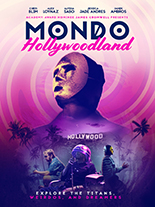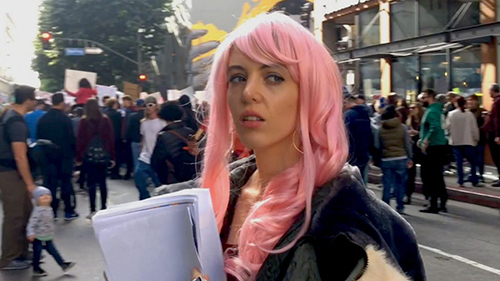
 Janek Ambros’ Mondo Hollywoodland is as hard to describe as it is to fully engage with. Even going into it knowing the experience will prove as nonlinear as a thousand Hula-Hoops makes the sit no easier. With a spark-quick attention span forever at odds with the pacing of individual scenes, it’s not everyone’s cup of mescaline.
Janek Ambros’ Mondo Hollywoodland is as hard to describe as it is to fully engage with. Even going into it knowing the experience will prove as nonlinear as a thousand Hula-Hoops makes the sit no easier. With a spark-quick attention span forever at odds with the pacing of individual scenes, it’s not everyone’s cup of mescaline.
To those of us familiar with that most peculiar style of cult film — the “mondo” movie — it’s obvious this experimental comedy name-checks the 1967 documentary Mondo Hollywood, which merited a memorable passage in David Kerekes and David Slater’s exhaustive tome, Killing for Culture: “The subjects for the most part are dull. People of local character (hippies) with over inflated egos, freely expound on the loveliness of Hollywood and their important place in it. One young man is something of a recurring motif, running around the film doing a madcap impression of Bela Lugosi as Dracula. Elsewhere, a woman recounts how she loves colors and once ate a piece of crayon in a sandwich while on acid.”
In spirit if not always specifics, those four sentences apply here. Mondo Hollywoodland’s audience surrogate is an omniscient visitor from the fifth dimension with one mission on the mind: “But what is today’s Hollywood really like? Indeed, we shall seek the answer.” The visitor (Ted Evans) pledges to find that resolve via “the titans, the weirdos and the dreamers.” In and out we flit about from one character to another, through freakout transitions like an art-school editing exercise (and I mean that as a compliment). The survey reveals overlapping lives and scenarios that wouldn’t be out of place in Slacker, Richard Linklater’s microbudget ode to Austin, half a country away.
 As with the latter, Hollywoodland appears to be heavily improvised, to a point that tests viewers’ patience and endurance. We get performance artists and dumpster divers, magic mushrooms and cocaine lines, a lost cat and a threat of rats, asshole agents and pompous teen stars. Although Ambros’ visuals often smack of the trippiest years of psychedelic ’60s, there’s contemporary talk of Antifa and Twilight, and one harsh — but funny — 9/11 joke.
As with the latter, Hollywoodland appears to be heavily improvised, to a point that tests viewers’ patience and endurance. We get performance artists and dumpster divers, magic mushrooms and cocaine lines, a lost cat and a threat of rats, asshole agents and pompous teen stars. Although Ambros’ visuals often smack of the trippiest years of psychedelic ’60s, there’s contemporary talk of Antifa and Twilight, and one harsh — but funny — 9/11 joke.
Ambros and friends never appear incompetent on either side of the camera, but the film is frivolous without truly being fun. Perhaps — and this is possible — the movie works like gangbusters to the L.A. crowd it lampoons; either way, I felt excluded from the punchline. One thing’s for sure: Mondo Hollywoodland is produced — and assumedly funded — by James Cromwell, whom we know from the likes of L.A. Confidential and Babe. The actor did the same for Ambros’ previous film, the documentary Imminent Threat, but why this? I dunno, but that’ll do, pig. —Rod Lott

